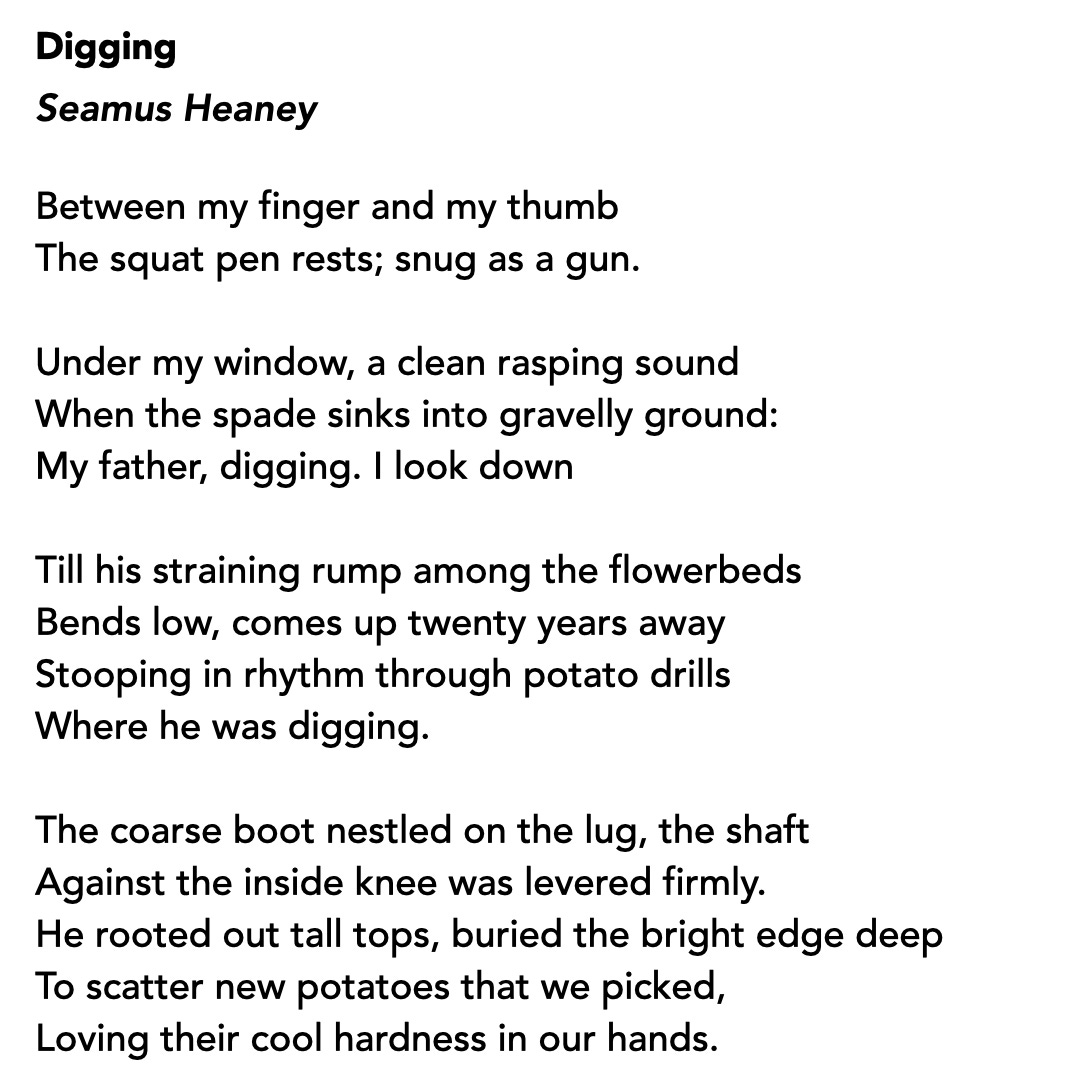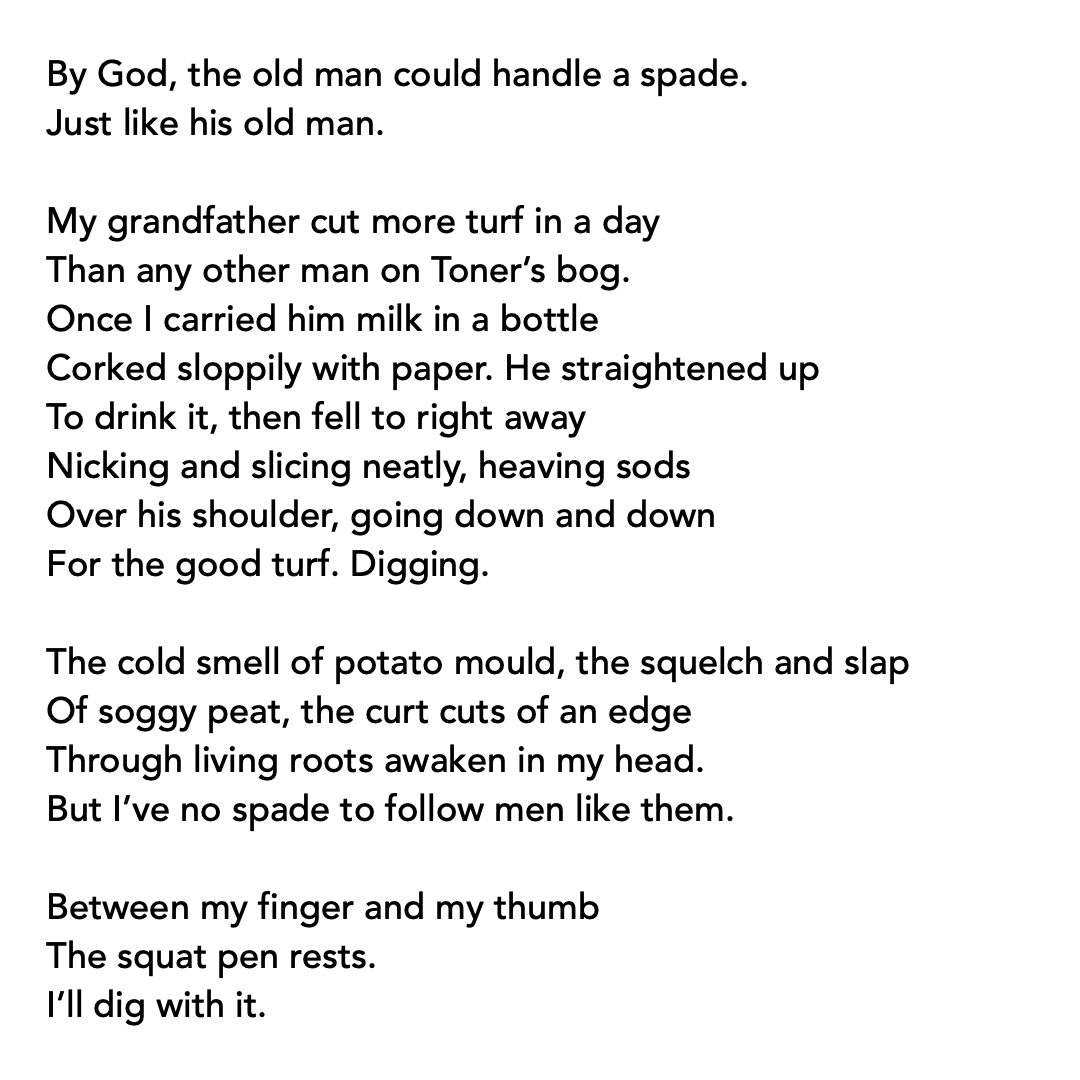One of my favourite stanzas of poetry comes from Seamus Heaney’s ‘Digging’. I first encountered this poem in school. I was astounded by the music of Heaney’s writing, more than anything. I remember looking up Irish history as I read his poems. His Nobel lecture is exquisite, and must be read in full.
Heaney comes from humble roots. His poetry reflects a deep connection with the soil, in which his father laboured, and his countryfolk. Speaking about the distance between those humble beginnings and Stockholm, where he was delivering the speech at the behest of the Swedish Academy and the Nobel foundation, he equates the place to a space station.
This is the basic context for the excerpt that I share below. I urge you to read the entire speech here (While you’re at it, perhaps you could cast a glance towards Wislawa Szymborska’s lecture entitled ‘The Poet and the World’ and Orhan Pamuk’s contemplation on his father’s suitcase. Both have been poetlied before. I share Pamuk’s lecture also because the beginning addresses the theme of today’s commentary tangentially.
From ‘Crediting Poetry’, delivered on December 7, 1995:
I credit poetry for making this space-walk possible. I credit it immediately because of a line I wrote fairly recently instructing myself (and whoever else might be listening) to “walk on air against your better judgement”. But I credit it ultimately because poetry can make an order as true to the impact of external reality and as sensitive to the inner laws of the poet’s being as the ripples that rippled in and rippled out across the water in that scullery bucket fifty years ago. An order where we can at last grow up to that which we stored up as we grew. An order which satisfies all that is appetitive in the intelligence and prehensile in the affections. I credit poetry, in other words, both for being itself and for being a help, for making possible a fluid and restorative relationship between the mind’s centre and its circumference, between the child gazing at the word “Stockholm” on the face of the radio dial and the man facing the faces that he meets in Stockholm at this most privileged moment. I credit it because credit is due to it, in our time and in all time, for its truth to life, in every sense of that phrase.
Heaney’s characterisation of the “commonality of experience” (that he writes about elsewhere) is a concept that has helped me understand my own expectations and demands from the form that I practice. Poetry as a bridge between the inner universe of the poet and the “external reality”, between writer and reader, between self and world, is a potent starting point for any artist. When a reader writes to me or tells me that words from a poem that they have read ‘struck a chord’, or resonated with their own personal experiences - when they say ‘I know what you felt. I have felt it too’ or ‘thankyou for putting words to my experience’, usually, a conversation begins. This is why I write. More than expression, for me, the poet’s work is communication.
We write
so that we can meet
others
like we.
Heaney’s ‘Digging’ pirouettes through a mesmerising soulscape. The poet begins with the pen, that concentrates the act of writing, in an object - a tool. It moves to the vision of his father, digging. Heaney’s gaze is tender, holding the grit and raw corporeality of a labouring man. A master of lyric sensorial description, Heaney, teaches the reader about attention - how the pen, like a microscope focuses attention on an ‘event’, and how it opens up empirical truth to pensive contemplation. In his descriptions things and attributes slowly start to wear the garb of symbol, and simple transactions become metonymies for complex historical and social truths. He deals with questions of labour, art, work, nation and revolution. I’ve often thought of Heaney as a communist poet. But this particular piece of writing hones in on his relationship with his father. He finds a point of meeting, a language whose dialect is different but pursuit is similar. I read it as a kind of meta Ars Poetica - speaking not so much about the craft of poetry, but the mysterious pull of the form of writing itself.
The last stanza houses one of my favourite voltas in all of English poetry.
I too have seen my appa digging, in his own way, with a persistence that I could never replicate. I have seen him at work, sacrificing his own comfort so that his children could lead a more comfortable life. I have seen him do this quietly. I think he understands, now, that, while I have not followed the path that he chose, I endeavour to dig, like he did - with my pen…
Today’s commentary is gratitude, for a father, who I am sure will read this.
I don’t have the words to convey what you mean to me, Appa.
Thankyou
:)
Feel free to mail poetly@pm.me with any questions, queries, or comments. I will write back as soon as I find the space, and the time.
If you like what you read, do consider ‘buying me a coffee’.


